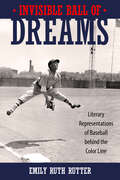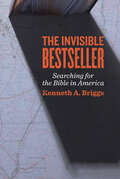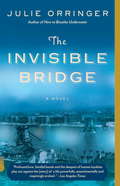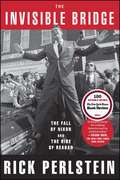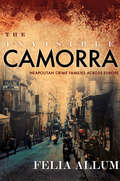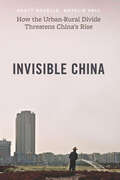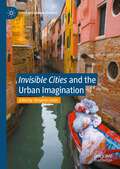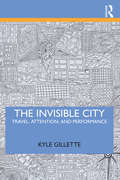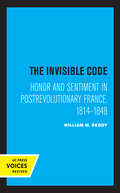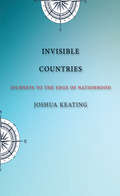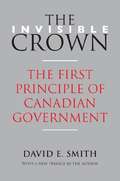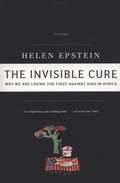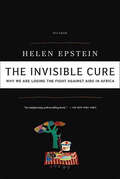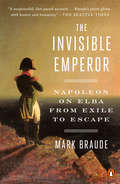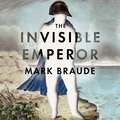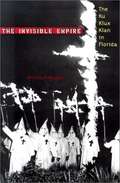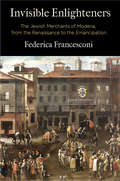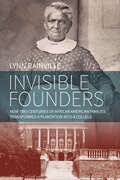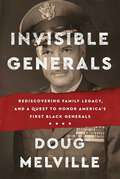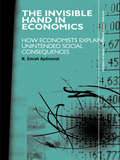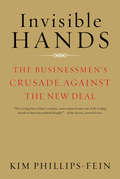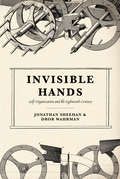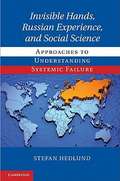- Table View
- List View
Invisible Ball of Dreams: Literary Representations of Baseball behind the Color Line
by Emily Ruth RutterWinner of the 2018 John Coates Next Generation Award from the Negro Leagues Research Committee of the Society for American Baseball Research Although many Americans think of Jackie Robinson when considering the story of segregation in baseball, a long history of tragedies and triumphs precede Robinson’s momentous debut with the Brooklyn Dodgers. From the pioneering Cuban Giants (1885-1915) to the Negro Leagues (1920-1960), Black baseball was a long-standing staple of African American communities. While many of its artifacts and statistics are lost, Black baseball figured vibrantly in films, novels, plays, and poems. In Invisible Ball of Dreams: Literary Representations of Baseball behind the Color Line, author Emily Ruth Rutter examines wide-ranging representations of this history by William Brashler, Jerome Charyn, August Wilson, Gloria Naylor, Harmony Holiday, Kevin King, Kadir Nelson, and Denzel Washington, among others. Reading representations across the literary color line, Rutter opens a propitious space for exploring Black cultural pride and residual frustrations with racial hypocrisies on the one hand and the benefits and limitations of white empathy on the other. Exploring these topics is necessary to the project of enriching the archives of segregated baseball in particular and African American cultural history more generally.
The Invisible Bestseller: Searching for the Bible in America
by Kenneth A. BriggsA personal and journalistic inquiry into the Bible's disappearance from American life In The Invisible Bestseller veteran religion writer Kenneth Briggs asks how the Bible remains the best-selling book of all time, while fewer Americans than ever can correctly articulate what it says, much less how it might offer guidance for their lives. How can a book — one that's found in courthouses, libraries, and millions of households across the land — be everywhere and nowhere at the same time? In his quest to make sense of the Bible's relative dis-appearance from public life, Briggs leads readers on a rollicking exploration that includes visits to Family Christian Stores, the Society of Biblical Literature, and the kitchen tables of everyday families. He offers insight on the Bible's current position in American public life and suggests where it may be headed next.
The Invisible Bridge (Vintage Contemporaries Ser.)
by Julie OrringerParis, 1937. Andras Lévi, a Hungarian-Jewish architecture student, arrives from Budapest with a scholarship, a single suitcase, and a mysterious letter he promised to deliver. But when he falls into a complicated relationship with the letter's recipient, he becomes privy to a secret that will alter the course of his--and his family's--history. From the small Hungarian town of Konyár to the grand opera houses of Budapest and Paris, from the despair of Carpathian winter to an unimaginable life in labor camps, The Invisible Bridge tells the story of a family shattered and remade in history's darkest hour.From the Trade Paperback edition.
The Invisible Bridge: The Fall of Nixon and the Rise of Reagan
by Rick PerlsteinFrom the bestselling author of Nixonland: a dazzling portrait of America on the verge of a nervous breakdown in the tumultuous political and economic times of the 1970s.In January of 1973 Richard Nixon announced the end of the Vietnam War and prepared for a triumphant second term--until televised Watergate hearings revealed his White House as little better than a mafia den. The next president declared upon Nixon's resignation "our long national nightmare is over"--but then congressional investigators exposed the CIA for assassinating foreign leaders. The collapse of the South Vietnamese government rendered moot the sacrifice of some 58,000 American lives. The economy was in tatters. And as Americans began thinking about their nation in a new way--as one more nation among nations, no more providential than any other--the pundits declared that from now on successful politicians would be the ones who honored this chastened new national mood. Ronald Reagan never got the message. Which was why, when he announced his intention to challenge President Ford for the 1976 Republican nomination, those same pundits dismissed him--until, amazingly, it started to look like he just might win. He was inventing the new conservative political culture we know now, in which a vision of patriotism rooted in a sense of American limits was derailed in America's Bicentennial year by the rise of the smiling politician from Hollywood. Against a backdrop of melodramas from the Arab oil embargo to Patty Hearst to the near-bankruptcy of America's greatest city, The Invisible Bridge asks the question: what does it mean to believe in America? To wave a flag--or to reject the glibness of the flag wavers?
The Invisible Camorra: Neapolitan Crime Families across Europe
by Felia AllumThe organized crime group that dominates much of the socioeconomic life of contemporary Naples, the Camorra, is organized by kin and geography, and it is notoriously the most violent, fractious, and disorganized mafia in Italy. The Camorra controls local extortion rackets, the drug and counterfeit trades, and other legal and illicit activities as well as wielding substantial political influence throughout Naples and its environs. Felia Allum has been researching the Camorra for twenty years, and in The Invisible Camorra she reveals a surprising alteration in Camorra behavior when operatives live outside the Neapolitan base. When gang members move away from Naples, having been forced out by intense policing and gang competition, they are attracted by business opportunities that, on the whole, fit in with their usual activities. When they move to other parts of Western Europe and are therefore no longer criminals simply by virtue of "mafia association" as they are in Italy, they become largely invisible. Gang members avoid the spectacular deployment of violence, they merge quietly into local life, they keep themselves to themselves, and, when necessary, use legitimate local actors such as lawyers and accountants to further their economic well-being. Allum has constructed a meticulous description and analysis of Camorra activities abroad. To build accounts of the Camorra in Germany and the Netherlands, France, Spain, and the United Kingdom, she has interviewed investigating magistrates, police officers, and confessed criminals; done substantial mining of Italian and European police data; and made extensive use of judicial investigations, court records and transcripts as well as of journalistic accounts. The result is the first systematic analysis of the overseas activities of this major criminal organization.
Invisible China: How the Urban-Rural Divide Threatens China’s Rise
by Scott Rozelle Natalie HellAs the glittering skyline in Shanghai seemingly attests, China has quickly transformed itself from a place of stark poverty into a modern, urban, technologically savvy economic powerhouse. But as Scott Rozelle and Natalie Hell show in Invisible China, the truth is much more complicated and might be a serious cause for concern. China’s growth has relied heavily on unskilled labor. Most of the workers who have fueled the country’s rise come from rural villages and have never been to high school. While this national growth strategy has been effective for three decades, the unskilled wage rate is finally rising, inducing companies inside China to automate at an unprecedented rate and triggering an exodus of companies seeking cheaper labor in other countries. Ten years ago, almost every product for sale in an American Walmart was made in China. Today, that is no longer the case. With the changing demand for labor, China seems to have no good back-up plan. For all of its investment in physical infrastructure, for decades China failed to invest enough in its people. Recent progress may come too late. Drawing on extensive surveys on the ground in China, Rozelle and Hell reveal that while China may be the second-largest economy in the world, its labor force has one of the lowest levels of education of any comparable country. Over half of China’s population—as well as a vast majority of its children—are from rural areas. Their low levels of basic education may leave many unable to find work in the formal workplace as China’s economy changes and manufacturing jobs move elsewhere. In Invisible China, Rozelle and Hell speak not only to an urgent humanitarian concern but also a potential economic crisis that could upend economies and foreign relations around the globe. If too many are left structurally unemployable, the implications both inside and outside of China could be serious. Understanding the situation in China today is essential if we are to avoid a potential crisis of international proportions. This book is an urgent and timely call to action that should be read by economists, policymakers, the business community, and general readers alike.
Invisible Cities
by Italo Calvino William WeaverImaginary conversations between Marco Polo and his host, the Chinese ruler Kublai Khan, conjure up cities of magical times. "Of all tasks, describing the contents of a book is the most difficult and in the case of a marvelous invention like Invisible Cities, perfectly irrelevant" (Gore Vidal). Translated by William Weaver. A Helen and Kurt Wolff Book. Unusual Table of Contents and presentation.
"Invisible Cities" and the Urban Imagination (Literary Urban Studies)
by Benjamin LinderIn 1972, Italo Calvino published Invisible Cities, a literary book that masterfully combines philosophy and poetry, rigid structure and free play, theoretical insight and glittering prose. The text is an extended meditation on urban life, and it continues to resonate not only among literary scholars, but among social scientists, architects, and urban planners as well. To commemorate the 50th anniversary of Invisible Cities, this collection of essays serves as both an appreciation and a critical engagement. Drawing from a wide array of disciplinary perspectives and geographical contexts, this volume grapples with the theoretical, pedagogical, and political legacies of Calvino’s work. Each chapter approaches Invisible Cities not only as a novel but as a work of evocative ethnography, place-writing, and urban theory. Fifty years on, what can Calvino’s dreamlike text offer to scholars and practitioners interested in actually existing urban life?
The Invisible City: Travel, Attention, and Performance
by Kyle GilletteThe Invisible City explores urban spaces from the perspective of a traveller, writer, and creator of theatre to illuminate how cities offer travellers and residents theatrical visions while also remaining mostly invisible, beyond the limits of attention. The book explores the city as both stage and content in three parts. Firstly, it follows in pattern Italo Calvino's novel Invisible Cities, wherein Marco Polo describes cities to the Mongol emperor Kublai Khan, to produce a constellation of vignettes recalling individual cities through travel writing and engagement with artworks. Secondly, Gillette traces the Teatro Potlach group and its ongoing immersive, site-specific performance project Invisible Cities, which has staged performances in dozens of cities across Europe and the Americas. The final part of the book offers useful exercises for artists and travellers interested in researching their own invisible cities. Written for practitioners, travellers, students, and thinkers interested in the city as site and source of performance, The Invisible City mixes travelogue with criticism and cleverly combines philosophical meditations with theatrical pedagogy.
The Invisible Code: Honor and Sentiment in Postrevolutionary France, 1814–1848
by William M. ReddyThis title is part of UC Press's Voices Revived program, which commemorates University of California Press’s mission to seek out and cultivate the brightest minds and give them voice, reach, and impact. Drawing on a backlist dating to 1893, Voices Revived makes high-quality, peer-reviewed scholarship accessible once again using print-on-demand technology. This title was originally published in 1997.
Invisible Countries: Journeys to the Edge of Nationhood
by Joshua KeatingA journalist explores how our world&’s borders came to be and how self-proclaimed countries across the globe could change the map. What is a country? While certain basic criteria—borders, a government, and recognition from other countries—seem obvious, journalist Joshua Keating investigates what happens in areas of the world that exist as exceptions to these rules. Invisible Countries looks at semiautonomous countries such as Abkhazia, Kurdistan, and Somaliland, as well as a Mohawk reservation straddling the U.S.-Canada border, and an island nation whose very existence is threatened by climate change. Through stories about these would-be countries&’ efforts at self-determination, Keating shows that there is no universal legal authority determining what a country is. He also argues that economic, cultural, and environmental forces could soon bring an end to our long period of cartographical stasis. Keating combines history with incisive observations drawn from his travels and interviews with residents, political leaders, and scholars in each of these &“invisible countries.&”
The Invisible Crown
by David E. SmithThe Crown is not only Canada's oldest continuing political institution, but also its most pervasive, affecting the operation of Parliament and the legislatures, the executive, the bureaucracy, the courts, and federalism. However, many consider the Crown to be obscure and anachronistic. David E. Smith's The Invisible Crown was one of the first books to study the role of the Crown in Canada, and remains a significant resource for the unique perspective it offers on the Crown's place in politics.The Invisible Crown traces Canada's distinctive form of federalism, with highly autonomous provinces, to the Crown's influence. Smith concludes that the Crown has greatly affected the development of Canadian politics due to the country's societal, geographic, and economic conditions. Praised by the Globe and Mail's Michael Valpy as "a thoroughly lucid, scholarly explanation of how the Canadian constitutional monarchy works," it is bolstered by a new foreword by the author speaking to recent events involving the Crown and Canadian politics, notably the prorogation of Parliament in 2008.
The Invisible Cure: Why We Are Losing the Fight Against Aids in Africa
by Helen Epstein<p>A New York Times Notable Book of 2007 The Invisible Cure is an account of Africa's AIDS epidemic from the inside--a revelatory dispatch from the intersection of village life, government intervention, and international aid. <p>Helen Epstein left her job in the US in 1993 to move to Uganda, where she began work on a test vaccine for HIV. Once there, she met patients, doctors, politicians, and aid workers, and began exploring the problem of AIDS in Africa through the lenses of medicine, politics, economics, and sociology. <p>Amid the catastrophic failure to reverse the epidemic, she discovered a village-based solution that could prove more effective than any network of government intervention and international aid, an intuitive response that calls into question many of the fundamental assumptions about the AIDS in Africa. <p>Written with conviction, knowledge, and insight, The Invisible Cure will change how we think about the worst health crisis of the past century--and indeed about every issue of global public health.</p>
The Invisible Cure: Why We Are Losing the Fight Against AIDS in Africa
by Helen EpsteinA New York Times Notable Book of 2007The Invisible Cure is an account of Africa's AIDS epidemic from the inside--a revelatory dispatch from the intersection of village life, government intervention, and international aid. Helen Epstein left her job in the US in 1993 to move to Uganda, where she began work on a test vaccine for HIV. Once there, she met patients, doctors, politicians, and aid workers, and began exploring the problem of AIDS in Africa through the lenses of medicine, politics, economics, and sociology. Amid the catastrophic failure to reverse the epidemic, she discovered a village-based solution that could prove more effective than any network of government intervention and international aid, an intuitive response that calls into question many of the fundamental assumptions about the AIDS in Africa. Written with conviction, knowledge, and insight, The Invisible Cure will change how we think about the worst health crisis of the past century--and indeed about every issue of global public health.
The Invisible Emperor: Napoleon on Elba from Exile to Escape
by Mark BraudePart forensic investigation, part dramatic jailbreak adventure, Mark Braude's The Invisible Emperor is a gripping narrative history of Napoleon Bonaparte's ten-month exile on the Mediterranean island of ElbaIn the spring of 1814, Napoleon Bonaparte was defeated. Having overseen an empire spanning half the European continent and governed the lives of some eighty million people, he suddenly found himself exiled to Elba, less than a hundred square miles of territory. This would have been the end of him, if Europe's rulers had had their way. But soon enough Napoleon imposed his preternatural charisma and historic ambition on both his captors and the very island itself, plotting his return to France and to power. After ten months of exile, he escaped Elba with just of over a thousand supporters in tow, landed near Antibes, marched to Paris, and retook the Tuileries Palace--all without firing a shot. Not long after, tens of thousands of people would die fighting for and against him at Waterloo.Braude dramatizes this strange exile and improbable escape in granular detail and with novelistic relish, offering sharp new insights into a largely overlooked moment. He details a terrific cast of secondary characters, including Napoleon's tragically-noble official British minder on Elba, Neil Campbell, forever disgraced for having let "Boney" slip away; and his young second wife, Marie Louise who was twenty-two to Napoleon's forty-four, at the time of his abdication. What emerges is a surprising new perspective on one of history's most consequential figures, which both subverts and celebrates his legendary persona. The Invisible Emperor is both a riveting story and an original examination of how preposterous, quixotic, and grandiose ideas can suddenly leap from the imagination and into reality.
The Invisible Emperor: Napoleon on Elba
by Mark BraudeFew historical figures are as well-known as Napoleon Bonaparte, and yet the Emperor's ten-month exile on the small island of Elba is virtually unexplored. Now, for the first time, we have a window into this critical moment when the most powerful man on earth turns defeat into one final challenge.A close character study mixed with a world-shaking drama, The Invisible Emperor will show Napoleon as he's never before been seen: as heart-broken husband, civil engineer, interior decorator, gardener and spy master. It will show a man at his nadir rise up against the global odds to build a miniature island empire, turn his two greatest foes into his closest confidantes, and return to France without firing a single shot.
The Invisible Empire: The Ku Klux Klan in Florida (The Florida History and Culture Series)
by Michael Newton Raymond Arsenault Mormin"The Ku Klux Klan was at least as violent in Florida as anywhere else in the nation, and the sheriffs, juries, judges, politicians, press, and citizens, for the most part, as culpable in its murderous history. [Its Florida history] is told for the first time in Michael Newton’s informative account."--David Chalmers, author of <i>Hooded Americanism: The History of the Ku Klux Klan</i> <p><p> In vivid, comprehensive, and often grim detail, <i>Invisible Empire</i> charts 130 years of Ku Klux Klan activity in Florida, one of the Klan’s most violent and enduring realms. Beginning with the chaotic days of Reconstruction, when Klansmen killed more than 150 victims in a single county, this important history describes the organization’s influence on Florida politics and its links to modern law enforcement. From the KKK’s heyday during the 1920s and 1930s, its alignment in the 1970s and 1980s with a growing crop of neo-Nazis and other cultists, and its emergence in the 1990s on the fringe of the “right-to-life” movement, Florida Klansmen have waged a constant war against progressive society. Their crimes range from petty vandalism to assassination and destruction of entire communities. Florida governors have courted Klan ballots, and high-ranking lawmen collaborated with the Klan in campaigns of arson and murder. In addition to recounting tales of violence, Newton addresses the critical question of how the hooded night riders continue to survive--a bitter, marginalized extremist movement that is still marching in what is arguably the Deep South’s most progressive and ethnically diverse state. He also discusses how to curb guerrilla warfare before the Klan and its allies inaugurate a new century of terror. <p><p> Michael Newton is a professional writer whose recent works include <i>Racial and Religious Violence in America: A Chronology; The Encyclopedia of Serial Killers</i>; and <i>The Ku Klux Klan: An Encyclopedia</i>, which received honorable mention awards from both the Simon Wiesenthal Center and the Southern Poverty Law Center’s Klanwatch project. He lives in Nashville, Indiana.
Invisible Enlighteners: The Jewish Merchants of Modena, from the Renaissance to the Emancipation (Jewish Culture and Contexts)
by Federica FrancesconiFederica Francesconi writes the history of the Jewish merchants who lived and prospered in the northern Italian city of Modena, capital city of the Este Duchy, during the seventeenth and eighteenth centuries. Her protagonists are men and women who stood out within their communities but who, despite their cultural and economic prominence, were ghettoized after 1638. Their sociocultural transformation and eventual legal and political integration evolved through a complex dialogue between their Italian and Jewish identities, and without the traumatic ruptures or dramatic divides that led to the assimilation and conversion of many Jews elsewhere in Europe.In Modena, male and female Jewish identities were contoured by both cultural developments internal to the community and engagement with the broader society. The study of Lurianic and Cordoverian Kabbalah, liturgical and nondevotional Hebrew poetry, and Sabbateanism existed alongside interactions with Jesuits, converts, and inquisitors. If Modenese Jewish merchants were absent from the public discourse of the Estes, their businesses lives were nevertheless located at the very geographical and economic center of the city. They lived in an environment that gave rise to unique forms of Renaissance culture, early modern female agency, and Enlightenment practice. New Jewish ways of performing gender emerged in the seventeenth century, giving rise to what could be called an entrepreneurial female community devoted to assisting, employing, and socializing in the ghetto. Indeed, the ghetto leadership prepared both Jewish men and women for the political and legal emancipation they would eventually obtain under Napoleon. It was the cultured Modenese merchants who combined active participation in the political struggle for Italian Jewish emancipation with the creation of a special form of the Enlightenment embedded in scholarly and French-oriented lay culture that emerged within the European context.
Invisible Founders: How Two Centuries of African American Families Transformed a Plantation into a College
by Lynn RainvilleLiteral and metaphorical excavations at Sweet Briar College reveal how African American labor enabled the transformation of Sweet Briar Plantation into a private women’s college in 1906. This volume tells the story of the invisible founders of a college founded by and for white women. Despite being built and maintained by African American families, the college did not integrate its student body for sixty years after it opened. In the process, Invisible Founders challenges our ideas of what a college “founder” is, restoring African American narratives to their deserved and central place in the story of a single institution — one that serves as a microcosm of the American South.
The Invisible Front: Love and Loss in an Era of Endless War
by Yochi DreazenThe unforgettable story of a military family that lost two sons—one to suicide and one in combat—and channeled their grief into fighting the armed forces’ suicide epidemic. <P> Major General Mark Graham was a decorated two-star officer whose integrity and patriotism inspired his sons, Jeff and Kevin, to pursue military careers of their own. His wife Carol was a teacher who held the family together while Mark's career took them to bases around the world. When Kevin and Jeff die within nine months of each other—Kevin commits suicide and Jeff is killed by a roadside bomb in Iraq—Mark and Carol are astonished by the drastically different responses their sons’ deaths receive from the Army. While Jeff is lauded as a hero, Kevin’s death is met with silence, evidence of the terrible stigma that surrounds suicide and mental illness in the military. Convinced that their sons died fighting different battles, Mark and Carol commit themselves to transforming the institution that is the cornerstone of their lives.<P> <i>The Invisible Front</i> is the story of how one family tries to set aside their grief and find purpose in almost unimaginable loss. The Grahams work to change how the Army treats those with PTSD and to erase the stigma that prevents suicidal troops from getting the help they need before making the darkest of choices. Their fight offers a window into the military’s institutional shortcomings and its resistance to change – failures that have allowed more than 2,000 troops to take their own lives since 2001. Yochi Dreazen, an award-winning journalist who has covered the military since 2003, has been granted remarkable access to the Graham family and tells their story in the full context of two of America’s longest wars. Dreazen places Mark and Carol’s personal journey, which begins when they fall in love in college and continues through the end of Mark's thirty-four year career in the Army, against the backdrop of the military’s ongoing suicide spike, which shows no signs of slowing. With great sympathy and profound insight, <i>The Invisible Front</i> details America's problematic treatment of the troops who return from war far different than when they'd left and uses the Graham family’s work as a new way of understanding the human cost of war and its lingering effects off the battlefield.
Invisible Generals: Rediscovering Family Legacy, and a Quest to Honor America's First Black Generals
by Doug MelvilleThis amazing true story of America&’s first Black generals, Benjamin O. Davis Sr. and Jr., a father and son who helped integrate the American military and created the Tuskegee Airmen, is &“the book Black America needs in this moment&” (Eboni K. Williams, lawyer and cohost of State of the Culture).Red Tails, George Lucas&’s celebration of America&’s first Black flying squadron, the Tuskegee Airmen, should have been a moment of victory for Doug Melville. He expected to see his great-uncle Benjamin O. Davis Jr.—the squadron&’s commander—immortalized on-screen for his selfless contributions to America. But as the film rolled, Doug was shocked when he realized that Ben Jr.&’s name had been omitted and replaced by the fictional Colonel A. J. Bullard. And Ben&’s father, Benjamin O. Davis Sr., America&’s first Black general who helped integrate the military, was left out completely. Dejected, Doug looked inward and realized that unless he worked to bring their inspirational story to light, it would remain hidden from the world just as it had been concealed from him. In this &“thoughtful, highly readable blend of family and military history&” (Kirkus Reviews), Melville shares his quest to rediscover his family&’s story across five generations, from post-Civil War America to modern day Asia and Europe. In life, the Davises were denied the recognition and compensation they&’d earned, but through his journey, Melville uncovers something greater: that dedication and self-sacrifice can move proverbial mountains—even in a world determined to make you invisible. Invisible Generals recounts the lives of a father and his son who always maintained their belief in the American dream. As the inheritor of their legacy, Melville retraces their steps, advocates for them to receive their long-overdue honors and unlocks the potential we all hold to retrieve powerful family stories lost to the past.
The Invisible Hand in Economics: How Economists Explain Unintended Social Consequences (Routledge Inem Advances In Economic Methodology Ser.)
by N. Emrah AydinonatThis is a book about one of the most controversial concepts in economics: the invisible hand. The author explores the unintended social consequences implied by the invisible hand and discusses the mechanisms that bring about these consequences.The book questions, examines and explicates the strengths and weaknesses of invisible-hand explanations co
Invisible Hands: The Businessmen's Crusade Against the New Deal (Playaway Adult Nonfiction Ser.)
by Kim Phillips-Fein"A compelling and readable story of resistance to the new economic order."--Boston Globe Invisible Hands tells the story of how a small group of American businessmen succeeded in building a political movement. Long before the "culture wars" of the 1960s sparked the Republican backlash against cultural liberalism, these high-powered individuals actively resisted New Deal economics and sought to educate and organize their peers. Kim Phillips-Fein recounts the little-known efforts of men such as W. C. Mullendore, Leonard Read, and Jasper Crane, drawing on meticulous research and narrative gifts to craft a compelling history of the role of big and small business in American politics--and a blueprint for anyone who wants insight into the way that money has been used to create political change. Some images in the ebook are not displayed owing to permissions issues.
Invisible Hands
by Jonathan Sheehan Dror WahrmanWhy is the world orderly, and how does this order come to be? Human beings inhabit a multitude of apparently ordered systems--natural, social, political, economic, cognitive, and others--whose origins and purposes are often obscure. In the eighteenth century, older certainties about such orders, rooted in either divine providence or the mechanical operations of nature, began to fall away. In their place arose a new appreciation for the complexity of things, a new recognition of the world's disorder and randomness, new doubts about simple relations of cause and effect--but with them also a new ability to imagine the world's orders, whether natural or manmade, as self-organizing. If large systems are left to their own devices, eighteenth-century Europeans increasingly came to believe, order will emerge on its own without any need for external design or direction. In Invisible Hands, Jonathan Sheehan and Dror Wahrman trace the many appearances of the language of self-organization in the eighteenth-century West. Across an array of domains, including religion, society, philosophy, science, politics, economy, and law, they show how and why this way of thinking came into the public view, then grew in prominence and arrived at the threshold of the nineteenth century in versatile, multifarious, and often surprising forms. Offering a new synthesis of intellectual and cultural developments, Invisible Hands is a landmark contribution to the history of the Enlightenment and eighteenth-century culture.
Invisible Hands, Russian Experience, and Social Science
by Stefan HedlundThis book investigates cases in which national and international activities have gone massively wrong, entailing seriously negative consequences, and in which the sophisticated analytical models of social science have ceased to be helpful. Illustrations range from the global financial crisis to the failure to achieve speedy systemic change in the former Soviet Union and the failure to achieve development in the Third World. The analysis uses as a backdrop long-term Russian history and short-term Russian encounters with unrestrained capitalism to develop a framework that is based in the so-called new institutionalism. Understanding the causes of systemic failure is shown to require an approach that spans across the increasingly specialized subdisciplines of modern social science. Demonstrating that increasing theoretical sophistication has been bought at the price of a loss of perspective and the need for sensitivity to the role of cultural and historical specificity, the book pleads the case for a new departure in seeking to model the motives for human action.
